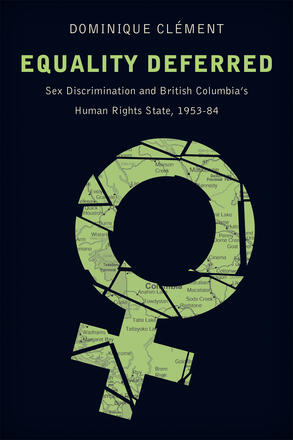
Equality Deferred
Sex Discrimination and British Columbia’s Human Rights State, 1953-84
The history of Canada's battle over human rights laws ? and the surprising untold story of the struggle for women's rights in British Columbia.
Description
In Equality Deferred, Dominique Cl?ment traces the history of sex discrimination in Canadian law and the origins of human rights legislation. Focusing on British Columbia ? the first jurisdiction to prohibit discrimination on the basis of sex ? he documents a variety of absurd, almost unbelievable, acts of discrimination. Drawing on previously undisclosed human rights commission records, Cl?ment explores the rise and fall of what was once the country's most progressive human rights legal regime and reveals how political divisions and social movements shaped the human rights state. This book is not only a testament to the revolutionary impact of human rights on Canadian law but also a reminder that it takes more than laws to effect transformative social change.
Reviews
Dominique Cl?ment has written a balanced account of the importance of human rights codes in promoting ideals of fairness and tolerance in Canada, and the simultaneous failure of human rights litigation (and education) to dismantle systemic discrimination. This book will be essential reading not only for human rights scholars but also for all those interested in equity and the promotion of social justice.
- Lori Chambers is a professor in the Department of Women?s Studies at Lakehead University
Dominique Cl?ment?s book is timely. The purpose and value of human rights are being challenged in the press and even in parliament. If we are to avoid an extended era of human rights retrenchment, it is important to learn what has been accomplished and how human rights codes and commissions have affected our lives.
- James W. St. G. Walker is a professor in the Department of History at the University of Waterloo